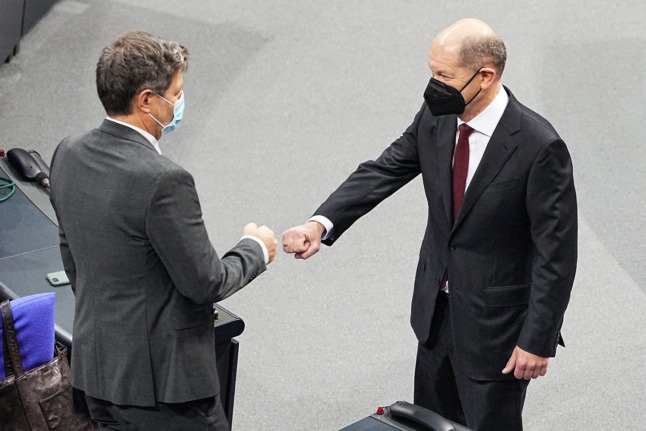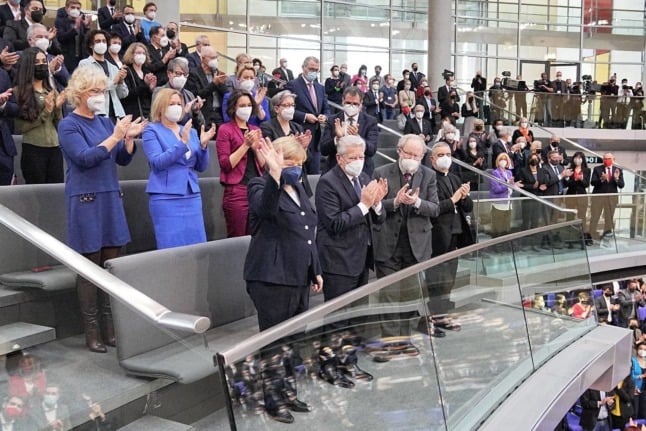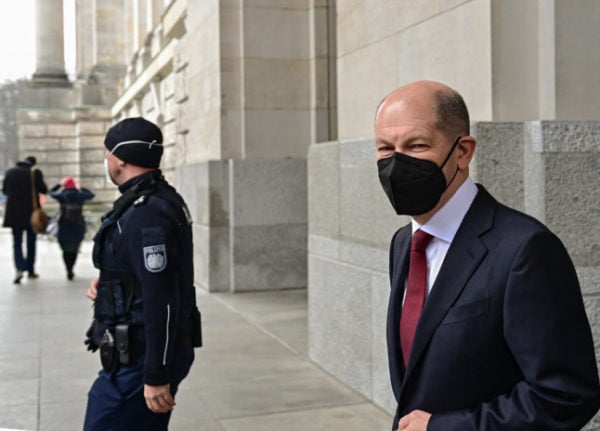Scholz was officially named the country’s ninth post-war leader by President Frank-Walter Steinmeier, who urged him to “ensure that the pandemic does not keep us firmly in its grip for another year” as a fourth wave of the coronavirus outbreak rages.
The former Finance Minister, who won 395 of the 707 votes cast in the Bundestag lower house, has vowed broad “continuity” with the popular Merkel
while making Germany greener and fairer.
READ ALSO: Scholz won’t revolutionise Germany – but change is welcome after Merkel
Asked by parliament speaker Bärbel Bas whether he accepted the election, a beaming Scholz removed his black corona mask to say “yes” and then received bouquets of flowers from all parliamentary groups except the far-right AfD.
SPD’s @OlafScholz secures a majority of 395 of 736 Bundestag lawmakers to become Germany’s new chancellor (21 short of coalition’s 416 – tho many are out sick). Scholz gives an understated nod when asked if he accepts the vote (rather than declaring it)… pic.twitter.com/VxYZKOj2Bv
— Patrick Donahue (@patrickjdo) December 8, 2021
Scholz led his Social Democrats to victory in the September 26th election – an outcome considered unthinkable at the start of the year given the party’s then festering divisions and anaemic support.
The 63-year-old, who turned emulating Merkel in style and substance into a winning strategy, has now cobbled together Germany’s first national “traffic light” coalition with the ecologist Greens and the liberal Free Democrats, nicknamed after the parties’ colours.
Their four-year pact sealed late last month is called “Dare for More Progress”, a hat tip to Social Democratic chancellor Willy Brandt’s historic 1969 pledge to “Dare for More Democracy”.
“We have a chance for a new beginning for Germany,” Scholz told his party at the weekend as it gave its blessing to the coalition agreement with 99-percent support.

The alliance aims to slash carbon emissions, overhaul decrepit digital infrastructure, modernise citizenship laws, lift the minimum wage and have Germany join a handful of countries worldwide in legalising marijuana.
French President Emmanuel Macron congratulated Scholz, pledging “we will write the next chapter together” while EU chief Ursula von der Leyen said she looked forward to cooperation for a “strong Europe”.
Scholz’s office announced his first official visit would take him to Paris and Brussels Friday for talks with Macron, von der Leyen and NATO chief Jens Stoltenberg.
Vladimir Putin said Russia was offering “constructive ties” with the new government, while China’s Xi Jinping said Beijing was willing to work with Scholz to “promote bilateral ties to a new level”.
Gender balanced
The new Foreign Minister, Annalena Baerbock, has also pledged a tougher line with authoritarian states such as Russia and China after the business-driven pragmatism of the Merkel years.
Greens co-leader Baerbock is one of eight women in Germany’s first gender-balanced cabinet.
“That corresponds to the society we live in – half of the power belongs to women,” Scholz, who describes himself as a “feminist”, said this week.
Scholz and his team promise stability just as France braces for a bitterly fought presidential election next year and Europe grapples with the enduring aftershocks of Brexit.
READ ALSO:
- KEY POINTS: Germany’s next government unveils coalition pact
- How the coalition agreement changes everyday life in Germany
However a vicious fourth Covid wave has already put the incoming coalition to the test.
“We have to make a fresh start while facing down the corona pandemic – those are the circumstances the new government is up against,” Scholz told reporters Tuesday, flanked by his designated finance and economy ministers, Christian Lindner and Robert Habeck.
More than 103,000 people have died with coronavirus in Germany while new infections have surged since the weather turned cold, filling intensive care units to the breaking point.
Scholz has thrown his weight behind Germany following Austria in making jabs mandatory to get the pandemic under control, as experts say the worst is still to come for the country’s struggling clinics.
He aims to have parliament vote on the issue before the year is out with a view to implementing the law in February or March.
READ ALSO: Germany’s traffic light parties sign new coalition agreement in Berlin
‘Lessons of history’
Merkel, 67, Germany’s first woman chancellor, is retiring from politics after four consecutive terms, the first post-war leader to step aside of her own accord.

Macron tweeted his gratitude to the outgoing leader.
“Thank you, dear Angela, for never forgetting the lessons of history, for having done so much for us, with us, to move Europe forward,” he said.
QUIZ: How well do you know Angela Merkel?
She leaves big shoes to fill, with large majorities of Germans approving of her leadership, even if her own party, the conservative Christian Democrats, often bridled against her moderate course.
Despite being from a rival party, Scholz tapped into that well of popular support in his bid to succeed Merkel while pledging to tackle the widening gap between rich and poor under her.
Meanwhile, Greens supporters are banking on billions flowing toward climate protection and renewable energy, even as the government pledges to return to a no-new-debt rule by 2023.
By Deborah COLE




 Please whitelist us to continue reading.
Please whitelist us to continue reading.
Member comments